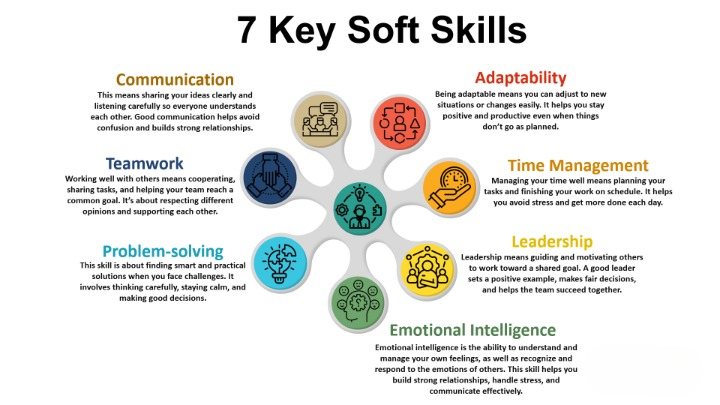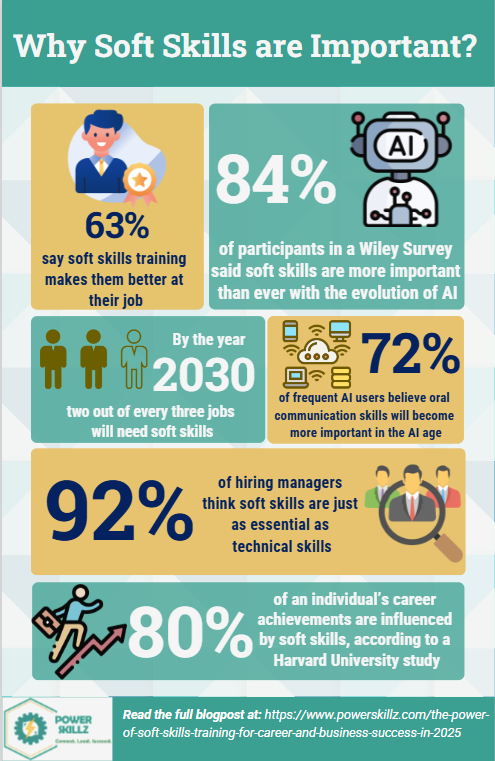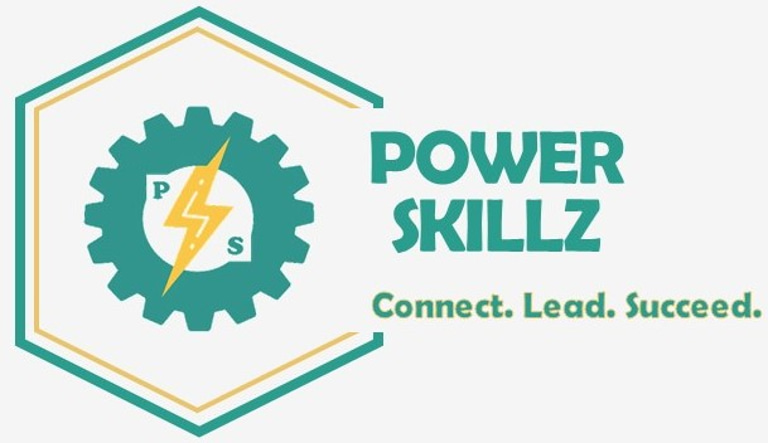The Power of Soft Skills Training for Career and Business Success in 2025
Discover why soft skills like communication, teamwork, and problem-solving are essential for success in school, work, and life. Learn simple tips to build these skills and boost your career with easy-to-understand advice for students and professionals.
Mavis Pereira
9 min read


Table of Contents
What are Soft Skills?
Importance of Soft Skills for Students and Professionals
Why College Students Need Soft Skills Training
Soft Skills Training for Career Growth and Success
Soft Skills Needed In Every Industry
Examples of How Soft Skills Make a Difference
How Weak Soft Skills Hurt Your Career
Simple Tips to Learn Soft Skills
The Future of Jobs: Why Soft Skills Matter
Final Thoughts
Did you know that 63 out of every 100 people say soft skills training makes them better at their job?
That is more than half! And here is something even more interesting: 92 out of 100 hiring managers believe soft skills are just as essential as technical skills. This means that being good at talking, listening, working with others, and solving problems is just as valuable as knowing how to use a computer or fix a machine.
Read on to know why every college student and professional needs soft skills training, no matter what job they want or which industry they work in.
What Are Soft Skills?
In simple words, soft skills are the abilities you use every day when you talk, listen, work with others, or solve problems. They are not about using a tool or a computer. They are about how you treat people and how you handle different situations.
Developing strong soft skills is crucial for personal and professional growth in today’s rapidly changing world. These abilities will help you express yourself clearly, collaborate effectively with others, and tackle new challenges with confidence.
The 7 key soft skills are Communication, Teamwork, Problem-solving, Adaptability, Time Management, Leadership, and Emotional Intelligence.




Importance of Soft Skills for Students and Professionals
You might think that only doctors, engineers, or computer experts need soft skills for their jobs. But actually, everyone benefits from understanding and developing strong soft skills. These skills help build stronger personal and professional relationships. They also make it easier to navigate challenges, collaborate with others, and achieve goals.
If you want to build your soft skills, Powerskillz offers simple, practical lessons designed for students, professionals and business owners at any level.
Here’s why investing in your soft skills matters for both students and professionals:
The World Is Changing Fast
By 2026, many jobs are going to change or disappear. People will need to learn new things and work in new ways. Machines and computers can handle many jobs, but they cannot talk or understand emotions like humans can. Developing your soft skills is essential to distinguish yourself in today’s constantly changing environment.
Employers Want Soft Skills
Most companies say that soft skills are just as vital as technical skills. In fact, 84 out of 100 managers and workers say that new employees need to show soft skills when they are hired. Sometimes, if two people have the same technical skills, the one with better soft skills will get the job.
Soft Skills Help You Work With Others
No one works alone all the time. Even if you are a scientist or a computer programmer, you need to talk to your team, share ideas, and listen to others. Soft skills help you make friends at work, solve problems together, and avoid fights.
Soft Skills Make You Stand Out
When you develop strong soft skills, people notice you. You become the person everyone wants on their team. You can explain things well, help others, and stay calm when things go wrong. This makes you a leader, even if you are not the boss.
Why College Students Need Soft Skills Training
If you are a college student, learning technical skills is important, but soft skills training can help you in ways that books and exams cannot. Soft skills such as communication, teamwork, and problem-solving are essential for success in any career and are highly valued by employers. These abilities are best developed through real-life experiences such as group projects and campus activities.
Strong soft skills also make you a more effective learner and help you adapt to new challenges. In today’s job market, your technical knowledge may get you noticed, but your soft skills will set you apart.
Below are listed some ways in which soft skills can make a real difference in your studies and future career:
Getting Ready for Jobs
When you go for a job interview, employers don’t just check your grades or technical knowledge. They also notice how you talk and listen. They pay attention to whether you can explain your thoughts clearly, listen carefully to questions, and respond politely. If you have practised these soft skills, you will feel more confident, answer questions better, and make a good impression. This can help you stand out from other candidates and increase your chances of getting the job.
Working on Projects
In college, group projects are common, and soft skills are essential for better communication with other team members. You need to explain your ideas in detail, listen to your teammates, and respect everyone’s opinions. Good teamwork helps the group finish the project on time and achieve better results. You also get a chance to practise being a leader by guiding your group, encouraging others, and helping solve problems together.
Handling Stress
College life can be busy and sometimes overwhelming, with many assignments, exams, and deadlines. Soft skills like time management help you plan your work and avoid last-minute stress. Adaptability helps people stay calm and adjust when things don’t go as planned. These skills make it easier to stay organised, keep a positive attitude, and healthily handle pressure.
Soft Skills Training for Career Growth and Success
Even after you land a job, soft skills training is still essential for your ongoing career growth and success. By boosting your soft skills, you can access new opportunities and advance in your career. Here is why investing in soft skills training is essential throughout your professional journey:
Jobs Are Always Changing
Technology is regularly changing. Some jobs disappear, and new ones appear. Soft skills help you learn new things and work in new ways. You can switch between different jobs more easily if you have good soft skills.
Better Relationships at Work
When you can talk confidently and listen and reply suitably, you get along better with your boss and your team. You can solve problems before they become difficult situations. You can also help new people feel welcome.
Becoming a Leader
To become a manager or team leader, you need to be good at understanding people, solving problems, and making good decisions. Soft skills training helps you learn these things.


Soft Skills Needed in Every Industry
You might think soft skills are only valuable for people who work in offices. But that is not true! Every job needs soft skills, no matter which industry you work in. Whether you work in healthcare, technology, education, or business, building strong soft skills can enhance your job performance and create new career opportunities. Let’s explore the role of soft skills in various industries:
Education
Teachers need to explain things in a way that is easy for students to understand. They should also understand when a student is struggling and give extra help or encouragement so everyone can learn.
Technology
Programmers and engineers often work as a team on big projects, so they must share ideas and listen to teammates. They also need to explain technical points in simple language to people who are not comfortable using computers.
Sales and Customer Service
Salespeople and customer service workers need to listen carefully to what customers want or need. They solve problems and try to ensure every customer feels satisfied and valued.
Small Businesses and Entrepreneurs
If you run your own business, you still need strong soft skills when you talk to customers, work with partners, and handle problems. These skills help your business grow and keep your customers happy.
Healthcare
Doctors and nurses must talk clearly with patients and their families so everyone understands what is happening. They also need to listen closely to people’s concerns and show kindness, especially when someone is worried or upset.
Examples of How Soft Skills Make a Difference
Soft skills are the personal qualities that help you work well with others and handle everyday challenges. They play a big role in making your work easier and more successful. In this section, you will see real examples of how soft skills like communication, teamwork, and problem-solving help people do better in their jobs and build strong relationships at work.
For Students
Riya, the College Student - Riya is a final-year engineering student who noticed that most of her classmates paid attention only to technical subjects. She worked on her communication and teamwork skills by joining college clubs and participating in group projects. During job interviews, Riya shared real examples of handling group tasks and solving conflicts. Employers were impressed, and she landed her first job quickly, proving that soft skills are just as important as academic achievements when starting a career.
For Young Professionals
Amit, the Office Professional - Amit works in a customer support role at a busy electronics company. He often handles calls from frustrated customers. Instead of reacting defensively, Amit listens patiently, shows empathy, and calmly resolves their issues. His emotional intelligence has helped turn many unhappy customers into loyal ones, earning him a promotion to team leader. Amit’s story shows how understanding others and communicating clearly can boost customer satisfaction and open doors for career growth.
For Business Owners
Neha, the Home-Based Saree Seller - Neha runs a small saree business from her home, selling through WhatsApp and Instagram. She made it a point to write polite messages, respond kindly to complaints, and resolve problems quickly. Her friendly and professional approach has led to happy customers who now recommend her sarees to their friends and family.
How Weak Soft Skills Hurt Your Career
Imagine a doctor who knows everything about medicine but cannot talk kindly to patients. Or a teacher who knows maths but cannot explain it easily. Or a shop owner who gets angry when customers complain. It means that even if people know their job skills very well, they will not be very successful without strong soft skills.
When you have weak soft skills, people may find it hard to trust or work with you. You might have trouble making friends at work or building good relationships with your boss and teammates. This can make your job feel lonely and stressful.
Employers often look for people who can speak clearly, listen to others, and solve problems calmly. If you struggle with these skills, you might miss out on promotions or new job opportunities, even if you are good at the technical parts of your job. Good soft skills help you work better with others, handle tough situations, and grow in your career. Without them, it is much harder to succeed and feel happy at work.


Simple Tips to Learn Soft Skills
The good news is that anyone can learn soft skills! These skills improve with practice, patience, and the right guidance. Here are some easy ways to start:
Join a soft skills training program: Many colleges, companies, and online platforms like Powerskillz offer easy-to-follow courses that help you improve important skills such as communication, teamwork, and problem-solving. These programs give you useful exercises and advice to practice in real life. Powerskillz provides practical lessons designed for students and professionals at all levels, making it simple to learn and practice soft skills anytime, anywhere.
Practice with friends and family: Use everyday moments to improve your skills. Listen carefully when someone talks, try to solve problems together, and share your ideas. Practicing with people you trust helps you feel more comfortable and confident.
Ask for feedback: Don’t be afraid to ask teachers, friends, or coworkers what you do well and where you can improve. Feedback helps you understand your strengths and areas to work on so you can keep getting better.
Watch and learn from others: Pay attention to how good leaders and team members behave. Notice how they talk, listen, and solve problems. You can learn a lot by watching how they handle different situations and then trying those skills yourself.
By using these simple steps regularly, you can develop strong soft skills that will help you succeed in school, work, and life.
The Future of Jobs: Why Soft Skills Matter
By 2030, two out of every three jobs will require strong soft skills. This means that people who have good communication, negotiation skills, leadership, teamwork, and problem-solving abilities will find more job options and better chances to grow. As computers and machines take over many technical tasks, people will be needed for things that only humans can do, like caring for others, thinking creatively, and working well with people.
If you are a student, it’s important to start learning soft skills now. These skills will help you do better in school and college, and they will prepare you for your first job. If you are already working, soft skills training can help you get promoted, work more smoothly with your team, and enjoy your job more.
Remember, soft skills are not just for work. They also help you be a better friend, family member, and part of your community. Being kind, understanding, and able to solve problems makes life easier and happier in many ways. Building these skills early will give you a strong advantage in the future job market and everyday life.
Final Thoughts
Soft skills training is not just an optional extra; it is a necessary foundation for success in today’s world. These vital abilities help you communicate and listen effectively, solve challenges, and work remotely with worldwide clients. No matter your career dreams or the industry you choose, strong soft skills will empower you to achieve your goals and stand out.
So, why wait? Start building your soft skills today! Your future self will be grateful for the investment. If you are serious about preparing for tomorrow’s job market and boosting your overall happiness, soft skills training is the best place to begin.
Are you prepared to boost your skills and career? Contact us today to find the perfect soft skills course for you and take the first step towards a brighter future!
